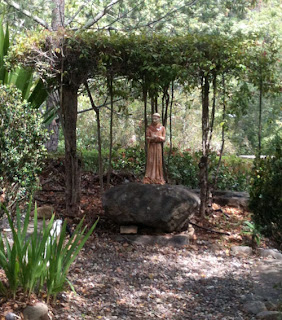"to be loved as to love" - Prayer of St. Francis
 |
| This is the same St. Francis as in the other posts, this is how small the statue is! |
O Divine Master, grant that I may not so much seek … to be loved, as to love.
The prayer has it right on the surface. It is in loving that we are loved by others. If we never extend our love to others we will probably not receive love from others. But reality is deeper and has many more layers than that.
The two great commandments are “you must love the Lord your God with all your heart, with all your soul, and with all your mind” (Matthew 22:37) and “you must love your neighbor as yourself” (Matthew 22:38).
I actually see three commands here. Love God. Love your neighbor. Love yourself.
Perhaps the most difficult of the three, and in a way the most important, is the last; love yourself. If you can’t love yourself, you won’t be able to enter a loving relationship with God or with your neighbor.
And, I think it proceeds in this order: Once you love yourself, once you accept who you are, once you are comfortable in your own self, then you can extend that love to others.
The a priori basis of the great commandments is explained in 1 John 4:8, “Whoever does not love does not know God, because God is love.” The common interpretation is usually whoever does not love his/her neighbor does not know God, because God is love, but I suggest an alternate interpretation. Whoever does not love himself/herself does not know God, because God is love.
So, how do you love yourself when it is so difficult to do so? As always, you start with God because we know that God is love, that God loves us, and that God’s love is unconditional.
The beautiful Hebrew word chesed describes this love from God. It is frequently translated into English as loving-kindness but it also contains traces of grace, compassion, and charity and reflects the covenant between God and Israel.
Chesed is an active noun because God’s love is active. The loving-kindness from God provides the grace and salvation we use to fuel our acts of love. It is our actions such as compassion and charity that demonstrate love to others and return love to us.
So returning full circle, I think the model of love that we should follow begins with God’s love toward us. Because God loves us, we know we are worthy to love ourselves. When we love ourselves, we love God and we love others and we demonstrate that love through loving actions. Finally, that love is returned to us, completing the cycle.
(To read other posts in the Prayer of St. Francis series, click here.)


Dan, I love how you brought this full circle, to include loving ourselves and God, before we have the resources to love others.
ReplyDeleteLove begins and ends with God, because He is the source of love.